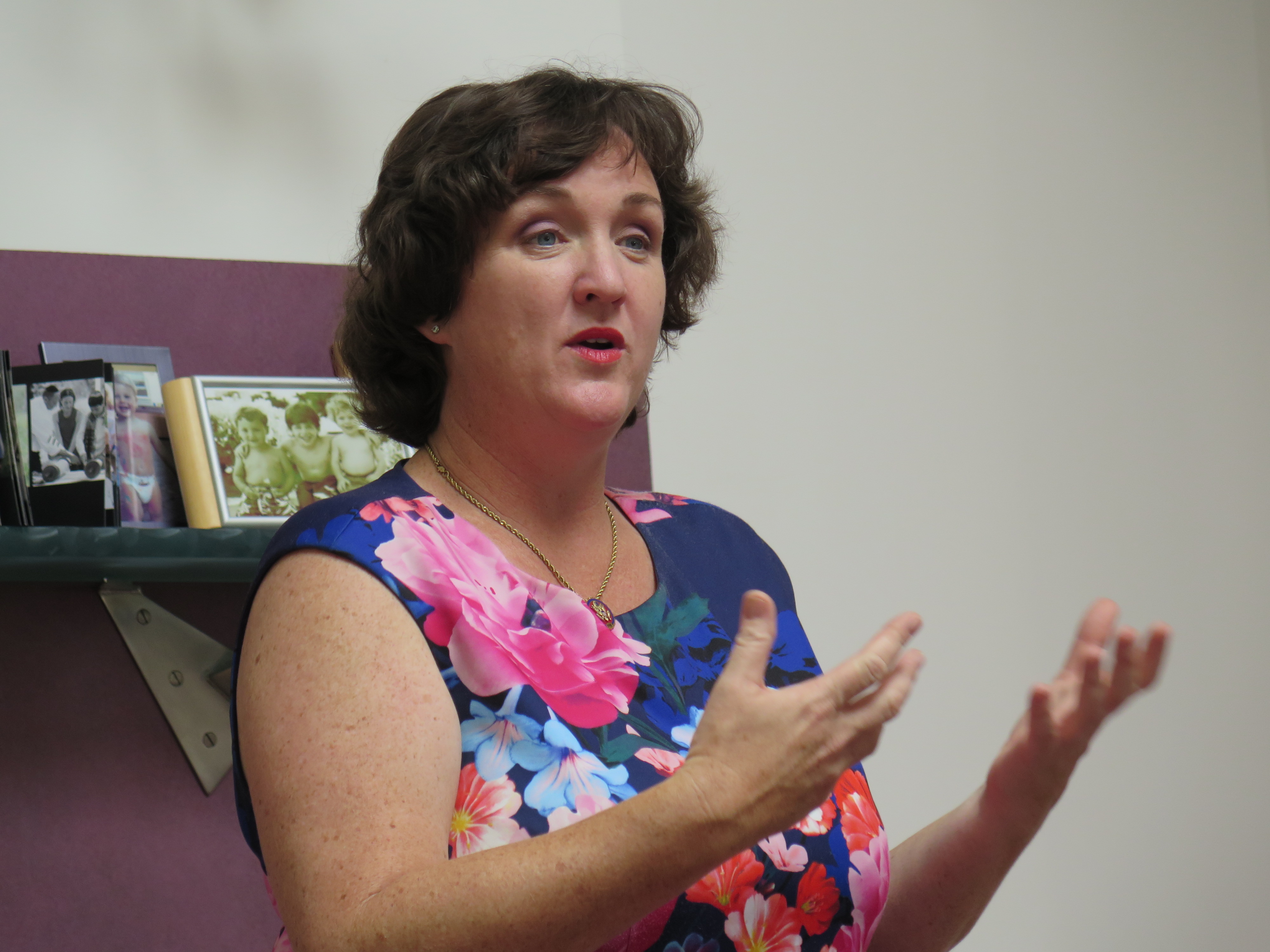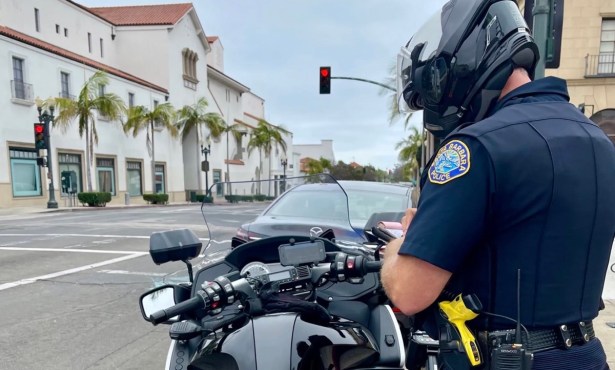Katie Porter Talks Trump
Rep. Who Turned Orange County Blue Discusses Impeachment and 2020 Presidential Race

On June 17, Rep. Katie Porter, D-Irvine, posted a video on Twitter telling her constituents that she had decided to support the impeachment of Donald Trump “after weeks of study, deliberation, and conversations with Orange County families.”
In doing so, Porter became the first member of the Democrats’ large “red-to-blue” class that flipped control of the House of Representatives from Republican control in the 2018 midterm elections.
In an interview with the Santa Barbara Independent during a visit to Santa Barbara on October 12, Porter talked about the reasons for her decision, along with some thoughts about the 2020 election. The transcript is lightly edited for clarity and length.
Why do you support Trump’s impeachment rather than waiting for the 2020 election? I think there are two different issues.
One is, I think we should support impeachment because we have a president who has repeatedly broken the law and put his personal interest and his political interest ahead of this country’s interest.
A separate issue is defeating Trump at the ballot box in 2020. Which to me is not only about upholding the rule of law in terms of our democracy in a free and fair election but is also about making sure that people understand that they are the ultimate repository of power in this country.
And so, the impeachment process is going to move forward through representatives in the House and the Senate. But the people of this country are going to make their mark against President Trump when they go to the ballot box in November 2020, so both of those are fights worth having.
You have little kids. What, specifically, do you fear for their futures if he gets a second term? I think that if the president is elected to a second term, the chance that we are drawn into one or more wars that put the lives of our children and grandchildren at risk is very high.
And this concern is only deepened by what’s happened in the last few days with the Turkish government, and the president encouraging and recently setting the stage for the Turkish government to result in the release of ISIS militants.
So the world is less safe today than it was last week; we are less safe as a country this week than we were last week because of the president’s actions, and I’m concerned about continued instability on the world stage, meaning that literally my children and your grandchildren will be fighting in foreign wars that could have been avoided by strong diplomatic relationships.
How would you characterize the level of corruption in the administration? High.
How high? Higher than Richard Nixon? Oh, you probably weren’t even around then…. (Laughs.) I was, like, barely born then.
I think that there are multiple aspects on the corruption front.
One is the corruption of this president in particular and the fact that we need to have some more safeguards against this kind of self-dealing, against this kind of corruption. It’s in some ways amazing that a country like ours, with a democracy like ours, has survived this long without someone like President Trump.
One of the things I sometimes tell my constituents when they say, you know, we aren’t doing enough to hold the president accountable, is that our Constitution didn’t actually contemplate a president who had this level of disregard for his patriotic duty.
We simply don’t have all the tools or regulations or rules in place that we need to. So I think there are lessons we take from the Trump presidency in terms of how do we think about moving forward with pro-democracy initiatives to safeguard against the next person like President Trump that may be coming down the line, the next person who fails to respect the law.
You were the first 2018 red-to-blue member to call for impeachment. Why did you reject Speaker Pelosi’s original argument that doing so could endanger the Democrats’ House majority? I think that the most important thing you can do for your constituents is to be true to what you think is right for this country, what you think is best for the United States. So I support impeachment because I believe we have a president who is [trampling] on the rule of law in ways that will damage this country irreparably if we don’t hold him to account.
So ultimately it wasn’t a political question for me. It was a question of right and wrong. There are always political consequences to decisions you make, but those political consequences shouldn’t drive your decision.
Second, I was part of a big group of people elected to Congress to stand up to this president and to be a check and balance. We asked voters who’d never voted before, people who infrequently vote and who don’t believe that their vote makes a difference, to turn out in races like mine, and they did.
What they deserve back is a leader who puts democracy first. Somebody who’s not afraid to make hard political choices to do what’s right. So I think it’s important to stand up for what you believe in.
The Speaker’s job is to bring the whole group of us forward, and she can’t do that if each of us individually isn’t signaling to her what the right values are that we should be fighting for.
Does it matter if the House impeaches and the Senate doesn’t convict Trump? Impeachment is a slender reed in the Constitution. There’s 10 words — there’s no 300-page handbook. So sometimes people say, ‘Why aren’t you doing this? Why aren’t you doing that?’
The Constitution doesn’t actually give us much of a playbook here. It just gives us the injunction to honor its words, which is what we’re trying to do.
But whether we do it through an impeachment investigation or articles of impeachment, whether we actually need to relieve the president to make the change — that, I think, is much harder to parse.
But I’ll tell you, standing up for what is right earns you the respect on both sides of the aisle and people who don’t even believe in the system at all because they see too few leaders.
In your speech, you suggested that you support the strategic argument in the 2020 race that Democrats should rely on increasing their base rather than persuading voters in the middle. Why? I will say that I think there are differences in different races. I have colleagues who won in deeply Trump districts where the voters are moderate in their views. In a district like that, it makes sense to have a moderate candidate.
But the idea that the only way to flip a seat, the only way to make change, is by almost invisibly incremental change is not true, and I’m proof of that in my race.
So as we think about 2020 and we think about the presidential, we need to think about how not just to keep these seats but how to make sure we hold them in the long term.
We have to recognize that the millennial generation is soon to be the largest base of voters in this country, and this is a generation whose experience with elections started with Al Gore and hanging chads and has only gotten worse.
This is a generation that has only ever known unlimited dark political spending. Who only have ever known a world in which corporations have equal free-speech rights as people, so we have to give those younger voters confidence that we will fight for them and that we will change this corrupt system.
Things like not taking corporate PAC money, things like standing up to corruption, things like calling out wrongdoing, whether it’s a corporate witness or the President of the U.S., give those people confidence that their vote might count.
And that, I think, is the single most unifying common thing that we have to be doing across this country today.
The election may come down to Wisconsin, Michigan, and Pennsylvania, the three states where Trump won the electoral votes that gave him the presidency. Can Elizabeth Warren win there? I have not yet made a public endorsement.
But I think Elizabeth Warren’s personal experience as a young mother, as a special education teacher, as somebody who went through a divorce and was a single mom, who faced discrimination in the workplace, who struggled to find childcare, her whole life story — her parents barely held it together; her father had a heart attack — her life story is a story of opportunity for working-class Americans.
So I have every confidence that when’s she’s able to tell that story, this is someone who connects on a deeply personal level about the struggles that families face every single day.



